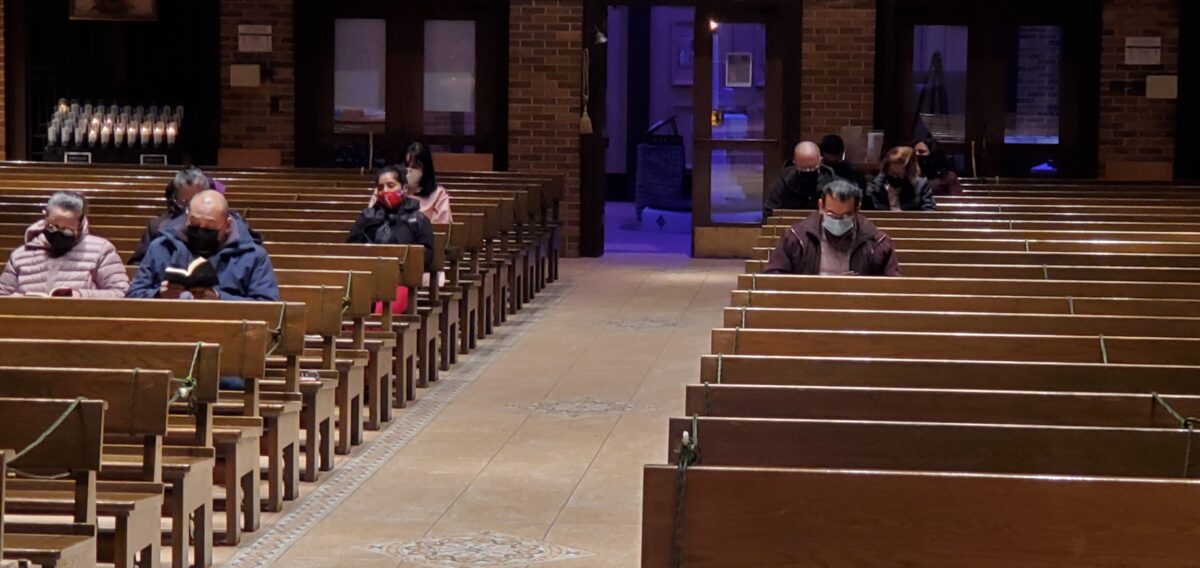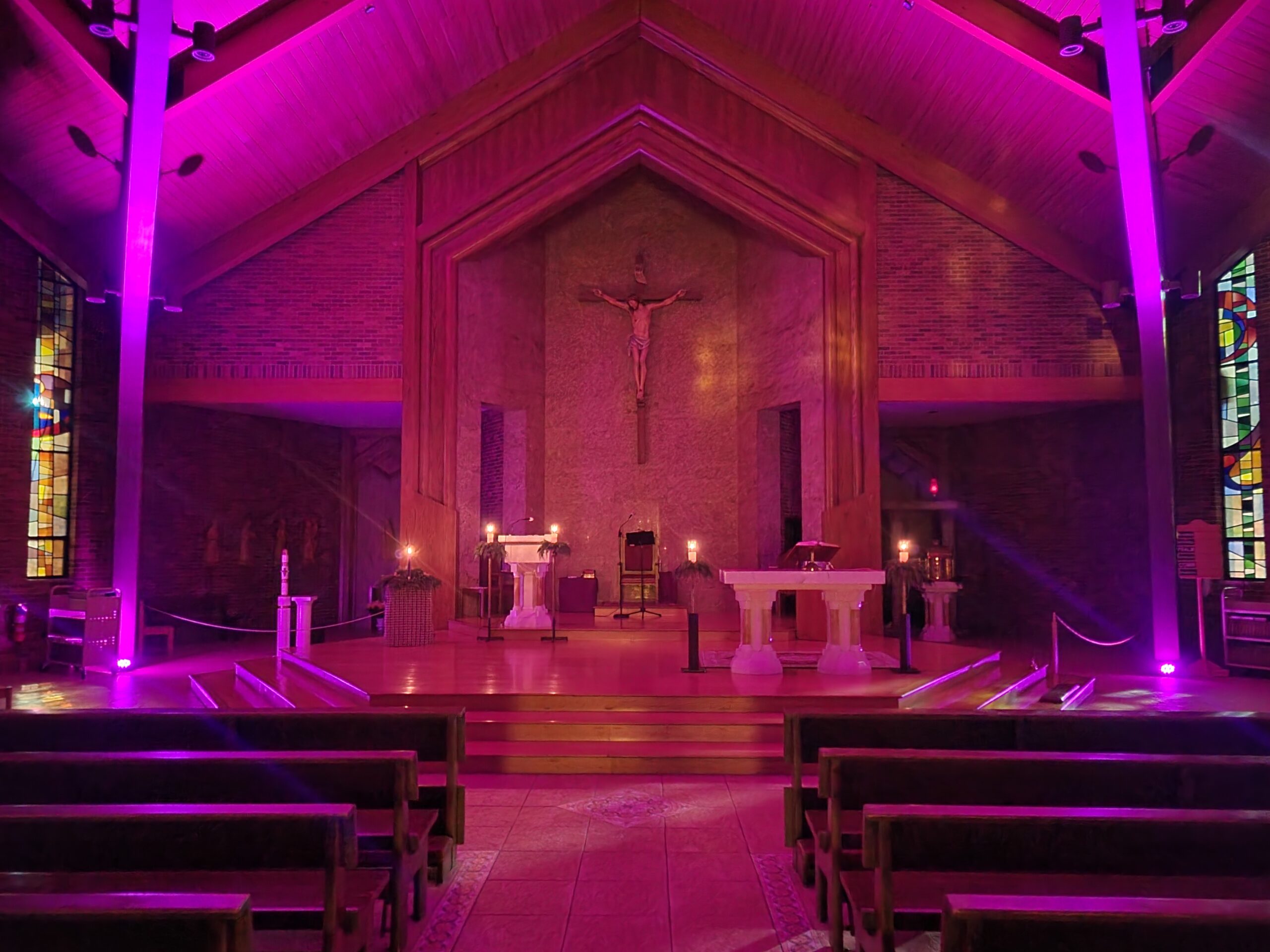“Christian meditation, led by the Spirit, leads us to this dialogue with Jesus. There is no page of the Gospel in which there is no place for us. For us Christians, meditating is a way of coming into contact with Jesus. And in this way, only in this way, we discover ourselves. And this is not a withdrawal into ourselves, no, no: It means going to Jesus, and from Jesus, discovering ourselves, healed, risen, strong by the grace of Jesus.” Pope Francis, address, April 28, 2021.
Our daily Monday to Friday parish prayer practice at St. Joseph is focused on two separate and adjoining sessions:
6:00pm Contemplative Prayer Session
6:30pm Liturgy of the Hours — Vespers (Spanish)
Contemplative Prayer Session
Sometimes people will say, “I said my rosary today,” or “I said my morning and evening prayers” or “Where can I go to do adoration.” Many of us were taught to pray using words, sometimes specific words. Maybe we were taught how to pray with our minds, without words. But most likely we were not given much instruction in contemplation.
Contemplative prayer is a surrender to the mystery of God, beyond reason, beyond logic. It is a listening in silence, an expectation. It is a forgetting of ourselves, and a discovery of our true selves. It is meant to cut out all the middle chatter and dialogue. At its best, contemplation is a process of interior transformation.
Richard Rohr says contemplation is “a long, loving look at the real.” Dorothy Solee says “Contemplation is revolutionary patience.”
The heritage of our contemplation goes back to the 3rd century, when the desert fathers and mothers fled civilization to find another kind of prayer, beyond saying prayers. So the word contemplation comes from that.
When we gather each evening in the church at 6pm from Monday to Friday, parishioners will likely be praying in one of these forms:
Lectio Divina (Monday only): Instead of actively reading the Scriptures for information, we surrender to the power of the Scriptures, and maybe we allow God to bring us close to maybe one word or one image.
Centering Prayer: when we use a sacred word to block out all of other thoughts, to stay always open to the presence and power of God.
Prayer of the Heart, or the “Jesus Prayer”: Lord Jesus Christ, have mercy on me, a sinner
Christian Meditation — Saying a single word — the recommendation is maranatha — for twenty minutes to allow God’s presence to become more real.
The Rosary — when we allow the repetition of the prayers to carry us beyond the words and into a contemplative space, the rosary is perfectly appropriate for our daily sessions.
Adoration of the Blessed Sacrament – when we have no set prayers to go with it, to simply adore in the presence of the reserved sacrament.
Liturgy of the Hours

“Oh God, come to my assistance
Lord, make haste to help me.”
The word liturgy comes from the Greek word for “public work.” In our vocabulary as ministers, we use the words “Mass”, the Eucharist, and the Liturgy interchangeably. But probably most parishioners do not use the word “liturgy” to refer to the Mass. Except for Eastern Catholics. Eastern Catholics, such as the Maronites and the Byzantines, don’t go to Mass, they go to the Divine Liturgy.
Within the Mass, many people know, because of their faith formation, that there is a Liturgy of the Word and a Liturgy of the Eucharist.
So we form a working definition of liturgy from our experiences of Mass. Liturgy refers to an order, a ritual, a flow of the worship service. And, usually for Catholics, that is a ritual that has worldwide application.
So the Liturgy of the Hours means that there is an order, a ritual, to help us pray during fixed hours of the day with prayer. The Liturgy of the Hours is also known as “The Divine Office,” “The Breviary” or “The Work of God.” In its complete version, the Liturgy of the Hours can be prayed seven times a day, with these names:
The Office of Readings, or Vigils, usually prayed before dawn
Lauds, or Morning Prayer, prayed early in the morning.
Mid-Morning Prayer
Noon Prayer
Mid-Afternoon Prayer
Vespers, or Evening Prayer
Night Prayer, or Compline
We could spend lots of time talking about the structure of each of these seven hours. But the idea is to surrender to the presence of God. So, the key to the Liturgy of the Hours is the Book of Psalms. The Book of Psalms, the “prayer book” of Jesus himself. Every time we go to Mass we pray at least one Psalm, after the First Reading. So you could say the Liturgy of the Hours is the vehicle that allows you to receive the wisdom and grace of the Book of Psalms. Although this is not exactly true, if you prayed all seven hours of the Liturgy of the Hours every day, in one week you would complete the whole Book of Psalms, which is 150 Psalms. So about 20 Psalms a day for seven days. Now, the actual official organization of the common Liturgy of the Hours does not do that. For example, Night Prayer usually uses the same two Psalms every night, Psalm 4 and Psalm 91.
The early desert mothers and fathers brought the Book of Psalms to a very important place in their prayer practice and that has continued to the present day.
What is most important about the Psalms, from a contemplative perspective, is that they are very human and they help lead us away from our own self-absorption. The Psalms can make our emotions more aligned with God. One Psalm may be very angry. In another there may be great sorrow and guilt. In another there is praise and joy. They help us to think with the mind of God. And that’s their value.
The desert monks were obligated to memorize the Psalms. All of us should at least have a few favorite psalms in our hearts. Even if we know a little bit about them. Psalm 23: The Lord is my Shepherd, for example. Jesus turned to the Psalms from the Cross. We need the Psalms for the big moments in our lives too.
At St. Joseph, we currently pray Vespers, or the Evening Prayer of the Church, nightly Tuesday-Friday in Spanish at 6:30pm. Devotees are now taking roles as prayer leaders and readers. All are welcome.

